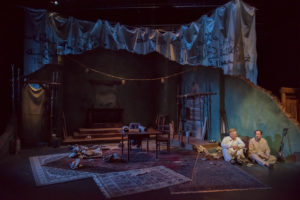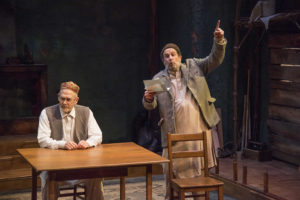
By Michele Markarian
“Two Jews Walk Into a War”, by Seth Rozin. Directed by Will LeBow. Presented by New Repertory Theatre, 321 Arsenal Street, Watertown through May 20.
What do you do if you are the last two Jews in Afghanistan, and you don’t get along? Such is the hilarious, conflict-ridden, deeply-layered premise of Seth Rozin’s two-hander, “Two Jews Walk Into a War”.
Inspired by a true story, “Two Jews” takes place in Kabul, where Ishaq (Joel Colodner) and Zeblyan (Jeremiah Kissel) are the last Jews standing. Yakob, their friend and buffer, has just died, with instructions for the two of them to uphold the future of Judaism in Afghanistan. Both men’s families have emigrated – one to America, one to Israel – and in spite of their misgivings, their dislike for one another, as well as frequent attacks by the Taliban, the men are stubbornly committed to staying. Their synagogue has been partially destroyed and looted, so when Ishaq comes up with the idea to inscribe the Torah in its entirety, Zeblyan reluctantly agrees.
What follows is 90 minutes of vaudeville-like, and oddly life-affirming, hilarity. The situation itself is hilarious, in an absurd kind of way. Of all the countries to settle in after the camps, the families of these two men end up in Afghanistan? Ishaq and Zeblyan argue over everything, from whose parents are responsible for settling in such a terrible country to who suffers more at the hands of the Taliban. Both are childish, justifying their positions with phrases like, “Because I called it first”, and parrying in a series of endless one-upmanship regarding their own sufferings and misfortunes. When they settle in – sort of – to transcribe the Torah, the differences between them really surface.

Ishaq is the more fundamentally religious one, even going so far as to use an imaginary tefillin when he prays. Colodner gives him great dignity and purpose, if not a bit of pomposity, which makes him a wonderful foil to Kissel’s more hyper, more questioning Zeblyan. Colodner and Kissel have superb chemistry; one would believe that yes, they’ve known each other for years, and yes, they hate each other with the intensity of family members (which they’re not). They bicker constantly and comically over the Torah’s commandments, which Zeblyan considers sexist – towards men. It’s a cycle without resolution, just like real life.
Will Lebow’s brisk direction keeps the action lively and the pace crisp against the backdrop of Jon Savage’s run-down, Old World set, with its Oriental rugs and broken altar. An oud player (Neema Jan) and percussionist (Grant Smith) add to the ambiance with soft, Middle-Eastern music played live between scenes.
I saw footage from Kabul in the 80s a few ago, at the beginning of a documentary called “Afghan Star”. Men and women, dressed in western clothes, the women without hijab, walked freely together on a college campus. Less than twenty years later, the Taliban changed the entire country. In Ishaq and Zeblyan’s Afghanistan, 30,000 Jews once lived, “a tolerated minority”. Of the two remaining, one refuses to leave the broken down synagogue. When Ishaq questions why Zeblyan would want to go out in the streets where there is constant danger of harassment, Zeblyan poignantly replies, “It’s my city. It’s my home.” A sharp reminder that home is home, no matter how quickly the landscape changes into something nearly unrecognizable. For more information, go to: http://www.newrep.org/

